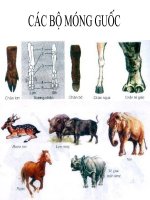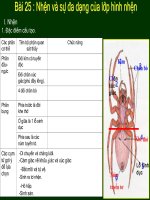Tải Giáo án Tiếng Anh lớp 11: First term revision 1 - Giáo án điện tử môn Tiếng Anh lớp 11
Bạn đang xem bản rút gọn của tài liệu. Xem và tải ngay bản đầy đủ của tài liệu tại đây (85.13 KB, 3 trang )
<span class='text_page_counter'>(1)</span><div class='page_container' data-page=1>
<b>FIRST TERM REVISION (P1)</b>
<b>I. AIMS/OBJECTIVES OF THE LESSON</b>
<b>1. Language focus:</b> - Ss revise the vocabulary in units 1, 2, 3, 4, 6 and 7
- Ss revise the pronunciation of some consonants and consonant clusters
<b>2. Skills: </b>Integrated skills
<b>3. Attitudes: </b>Ss are eager to revise for their end term examination
<b>II. PREPARATION</b>
<b>1. Teacher:</b> - <b>Teaching aids</b>: Lesson plan, text book, exercises
- <b>Teaching method</b>: Communicative language teaching
<b>2. Students: - </b>Revise Vocabulary in units 1, 2, 3, 4, 6, and 7 at home
<b>III. Procedure:</b>
<b>1. Class organization (1 minute)</b>
<b>2. Check – up (5 minutes)</b>- Some Ss go to the board, do the exercises again
<b>3. Revision contents (35 minutes)</b>
- Vocabulary Unit 1: Friendship Unit 2: Personal Experiences Unit 3: A
Party
Unit 4: Volunteer Work Unit 6: Competitions Unit 7: World
Population
- Pronunciation: /dƷ/, /t /, /m/, /n/, /ng/, /l/, /r/, /h/, /w/, /j/, /tr/, /dr/, /tw/,<sub>⨜</sub>
/kl/, /gl/, /kr/, /gr/, /kw/
<b>Rehearsal test</b>
<b>Chọn từ mà phần gạch chân có cách phát âm khác với những từ còn lại:</b>
1. A. figure B. grow C. organize <b>D. average</b>
2. A. cheese <b>B. chemical</b> C. children D. teacher
<b>Chọn từ có trọng âm chính nhấn vào âm tiết có vị trí khác với các từ cịn lại:</b>
<b>3. A. volunteer</b> B. effective C. tomorrow D. promotion
4. A. illiterate <b>B. education</b> C. eradicate D. minority
<b>Chọn từ/ cụm từ thích hợp ứng với A, hoặc B, C, D để hoàn thành câu sau:</b>
5. The new students hope... in many of the school’s social activities.
<b>A. to be included</b> B. to include C. including D. being included
6. The police let him... after they had asked him some questions.
A. to leave <b>B. leave </b> C. leaving D. left
7. Their friendship was based on... respect, trust and understanding.
A. attractive B. loyal <b>C. mutual </b> D. suspicious
8. Their friendship was based on... respect, trust and understanding.
A. attractive B. loyal <b>C. mutual</b> D. suspicious
9. Laura and John are happy together for their silver...
A. party <b>B. anniversary</b> C. celebration D. occasion
10. We can’t grow enough food to ………… the increasing population.
<b>A. support</b> B. supporter C. supportable D. supportive
11. ... is the state of not knowing how to read or write.
A. Literacy <b>B. Illiteracy</b> C. Campaign D. Struggle
12. The children enjoyed ………... on fishing trips.
A. taking B. to be taken <b>C. being taken </b> D. having taken
13. Alberto is always afraid of... mistake when he speaks English.
A. doing <b>B. making</b> C. to do D. to make
14. John always dreams... a doctor.
</div>
<span class='text_page_counter'>(2)</span><div class='page_container' data-page=2>
A. about B. at <b>C. for </b> D. up
16. How many... are there in the competition?
<b>A. participants</b> B. participates C. participations D. participative
17. The doctor said ………… the patient did not stop smoking, he’d be seriously ill.
<b>A. that if</b> B. whether C. if that D. as if
18. ... is the limitation of the number of children born.
A. Population B. Resource C. Birth rate <b> D. Birth control</b>
19. If you had taken my advice, we... our way.
A. will not lose B. would not lose <b>C. would not have lost </b> D. had lost
<b>Chọn từ thích hợp ứng với A, hoặc B, C, D để điền vào chỗ trống trong đoạn văn sau.</b>
In some countries there is negative population growth, …(15)… means that the population …
(16)…,especially in Central and Eastern Europe, mainly due to low birth rates, and Southern Africa
due to the high number of HIV-related …(17) … Within the next decade, Japan and Western Europe
are also …(18) … to encounter negative population growth due to sub-replacement fertility rates.
Population growth which exceeds the carrying capacity of an area or environment …(19)… in
overpopulation. Conversely, …(20) … areas may be considered “underpopulated” if the population is
not large…(21) … to maintain an economic system. The future of world’s population could be
significantly …(22) … by the worldwide HIV/AIDS pandemic. In Africa, birth rates are already …
(23) … highest in the world, especially in sub-Sahara Africa. But if HIV/AIDS is controlled or even
eradicated, the world’s population could increase …(24) … faster than predicated.
<b>20. A. which</b> B. that C. this D. whose
21. A. increases B. grows C. raises <b> D. decreases</b>
22. A. die B. dead <b>C. deaths </b> D. deadly
23. A. appeared B. represented <b>C. expected</b> D. shown
24. A. leads <b>B. results</b> C. makes D. causes
25. A. so <b>B. such</b> C. so as D. such as
<b>26. A. enough</b> B. too C. very D. quite
27. A. infected <b>B. affected</b> C. indicated D. interfered
28. A. a B. an <b>C. the </b> D. no article
29. A. as B. more C. many <b> D. much</b>
<b>Xác định từ hoặc cụm từ có gạch dưới cần phải sửa để câu trở thành chính xác:</b>
30. Overpopulation is a short way to lead to poor, illiteracy, and social evils.
A B <b>C</b> D
31.Mr. and Mrs. Smith looked forward to meet their children soon.
A B <b>C</b> D
32 The teacher encouraged John <b>joining</b> the football team.
A B <b>C</b> D
<b>Chọn câu ứng với A, hoặc B, C, D thích hợp với câu sau:</b>
33“Don’t talk in class,” the teacher said to his students.
A. The teacher told his student do not talk in class.
B. The teacher told his students did not talk in class.
<b>C. The teacher told his students not to talk in class.</b>
D. The teacher told his students not talking in class.
34The customer said, “I would like to buy a coat.”
<b>A. The customer wanted to buy a coat.</b> B. The customer said to buy a coat.
C. The customer told to buy a coat. D. The customer warned her to buy a coat.
35 “It was very nice of you to visit me. Thank you,” Miss White said to John.
<b>A. Miss White thanked John for visiting her.</b>
B. Miss White told John to visit her.
</div>
<span class='text_page_counter'>(3)</span><div class='page_container' data-page=3>
D. Miss White would like John to help her.
<b>Đọc đoạn văn và trả lời các câu hỏi bằng cách chọn phương án đúng với A, B, C hoặc D.</b>
There are many proverbs about friends and friendship, such as “True friendship is like sound
health; the value of its seldom know until it is lost”, and “A real friend is someone who walks in when
the rest of the world walks out”. When you read these quotes, stop and think about your friendship. Do
you and your friends act in a caring way towards one another, do you respect them and do they respect
you, but most of all do you value the relationship and love spending time together? Friendship is more
than just hanging out together and gossiping about other people. True friendship is when two people
have mutual respect for one another, and really care about the each other’s feelings and dreams. You
need to be able to be honest with your friends. If there is ever a time when you feel that you cannot tell
them the truth, for fear that they will be mad or will not understand, then they are not true friends.
Friends share with each other important things that they would not share with others. Friends also care
about each other, stick up for one another and enjoy spending time together.
[ hang out: visit often, stick up: be upright]
36. The passage is about...
A. a friend <b>B. friendship</b>
C. proverbs about friends and friendship D. caring for friends
37. The author advised us...
A. not to tell a secret to a friend. <b>B. to respect our friends.</b>
C. not to tell a friend about important things. D. to make friends to gossip
38. Friends...
A. should not spend time together <b>B. should be honest</b>
C. should gossip about others D. should not care much
39. Which sentence is NOT true?
A. Friends should respect each other. B. We should be honest with our friends.
C. We can share important things with a friend. <b>D. Dishonesty is needed for true friendship.</b>
40. Which of these can be used to describe true friendship?
A. be honest and be mad B. hang out and gossip
C. have lunch and gossip <b>D. trust, respect and share</b>
<b>4. Consolidation </b>(3 mins) - Vocabulary in units 1, 2, 3, 4, 6, and 7
- Pronunciation
</div>
<!--links-->









